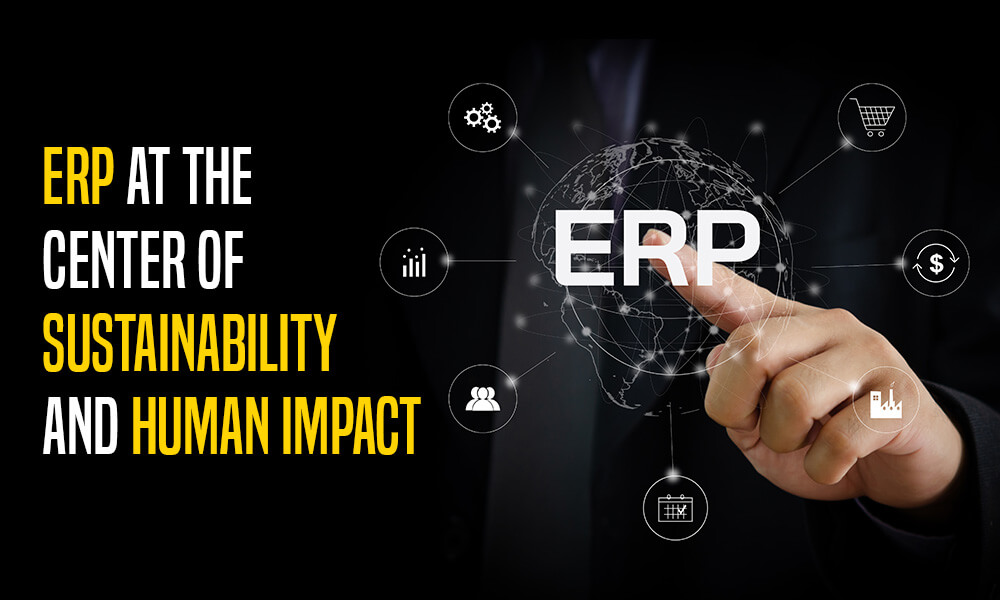In today’s world, where environmental conservation and social responsibility are mounting challenges, the ERP system has emerged as an important tool at the forefront of sustainability. Aside from saving time and money, an ERP system can help you reduce scrap, optimize resource utilization and ultimately reduce energy and environmental waste.
With ERP platform, businesses can streamline operations and foster eco-friendly practices. It helps transform their operations and become more diligent towards sustainability and socially responsible.
In this blog, we explore the eco-friendliness of ERP, its profound implications on sustainability and human well-being. Let us understand how this technology catalyzes positive change on both environmental and societal fronts.
1. Sustainable Supply Chain Management:
One of the key areas where ERP systems make a significant impact is Supply chain management.
ERP allows companies to track their entire supply chain, right from raw material procurement to product distribution. This level of transparency helps organizations identify and reduce their environmental footprint by optimizing transportation routes, reducing excess inventory, and minimizing waste.
By streamlining the supply chain with the help of ERP, businesses can reduce emissions, energy consumption, and resource utilization, contributing to sustainability goals.
2. Real-time Data for Informed Decision Making:
ERP equips organization users with real-time data and analytics, enabling them to make informed decisions.
ERP helps businesses set and monitor sustainability targets, track progress, and adjust their strategies based on accurate data received about resource consumption, emissions, and social impact. This data-driven approach empowers companies to prioritize environmentally and socially responsible practices.
3. Waste Reduction and Circular Economy:
ERP plays a pivotal role in reducing waste and supporting the transition to a circular economy.
Businesses can use ERP data to identify areas where waste can be minimized, and resources can be reused or recycled. This not only reduces costs but also promotes sustainable practices and minimizes the organization’s environmental impact through its operations.
4. Compliance and Reporting:
Compliance with environmental and social responsibility standards is paramount in an increasingly regulated world.
With automated data collection and reporting processes, ERP systems help companies maintain compliances that are applicable to them. This allows organizations to meet legal requirements and avoid costly penalties while demonstrating their commitment to sustainability and ethical business practices.
5. Traceability and Ethical Sourcing:
Consumers are increasingly conscious of the social and environmental impact of the products they purchase.
ERP system integration enables businesses to track the origin and journey of products, from the source of raw materials to the hands of the consumers.
This transparency allows organizations to prove the ethical sourcing of materials and labor, helping to build trust and credibility with environmentally and socially conscious customers.
6. Human Resources and Employee Engagement:
Sustainability and human impact are not limited to external factors. ERP systems can also play a role in the internal aspects of an organization.
By providing tools for managing human resources, ERP systems help companies improve employee engagement, promote diversity, inclusion, and support sustainable workplace practices.
How does SourcePro help its ERP Customers to achieve sustainability in their business?
SourcePro works closely with their customers to achieve these objectives, creating a world where business and sustainability go hand in hand.
With increasing pressure on businesses to address environmental and social challenges, ERP platform provides data, insights, and automation that are needed to create a more sustainable and socially responsible future.
At SourcePro, our commitment to our customers goes beyond providing efficient business streamlining. Our dedicated team works closely with customers to identify process improvement, cost reduction, and environmental impact reduction opportunities.
Moreover, through integration with other legacy applications, we help our customers optimize their operations while ensuring they align with sustainable practices.
By integrating sustainability and ethical considerations into their core processes, organizations can reduce their environmental and social footprint to enhance their reputation and competitiveness in an evolving business landscape. In this way, ERP solutions are helping businesses build a more sustainable and responsible world for the benefit of all.
Contact us today to learn more about how we, as an ERP system company, can drive your sustainability and social responsibility initiatives forward.
